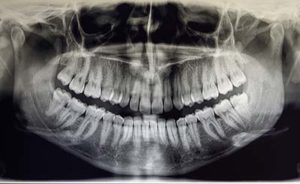If you are looking for a provider of dental X-rays at Lovett Dental Meyerland Plaza offers a comfortable environment and highly skilled professionals to produce those X-rays. There are two primary categories of diagnostic dental X-rays at Lovett Dental Meyerland Plaza: intraoral (inside the mouth) and extraoral (taken from outside the mouth).
Types of Dental X-Rays Available at Lovett Dental Meyerland Plaza
 The most common type of diagnostic X-ray is the intraoral X-ray. Each type shows varying aspects of your teeth.
The most common type of diagnostic X-ray is the intraoral X-ray. Each type shows varying aspects of your teeth.
Intraoral Dental X-Rays
Bitewing X-rays display details of the lower and upper teeth in one quadrant of the mouth. Each X-ray displays your tooth from the level of the supporting bone to its crown. These X-rays show changes in the thickness of dental bone resulting from gum disease. They also show decay between your teeth. Dentists use them to help determine the appropriate fit of a crown or other restorations. They will also see any breakdown of fillings or wear on your teeth.
Periapical X-rays display the entire tooth from the crown to where the tooth attaches to your jaw. Dentists can use these to detect unusual changes in the roots or bone structure.
Occlusal X-rays show the placement and development of a complete arch of teeth in either the lower or upper jaw.
Extraoral Dental X-Rays
Dentists use extraoral X-rays to pinpoint dental issues in the skull and jaw. There are several categories of extraoral X-rays.
Panoramic X-rays display the whole mouth area, including all of your teeth in both the lower and upper jaws. It produces a single picture. Dentists can determine the position of emerging teeth, fully emerged teeth, and impacted teeth. They can also use these pictures to help diagnose tumors.
Tomograms display a specific layer of the mouth while blurring out the other layers. This helps the dentist see structures blocked from view.
Cephalometric projections display the entire side of your head. A dentist will see your teeth in relationship to your jaw and profile. Orthodontists utilize these types of X-rays to determine a specific realignment approach for each patient.
A sialogram uses a dye that gets injected into your salivary glands. This allows the dentist to take an X-ray because your salivary glands are soft tissue, which the dentist typically cannot see with X-rays.
More Dental X-Ray Options
Dental computed tomography (CT) displays the interior structures in 3D to help pinpoint issues in the facial bones like tumors, cysts, and fractures.
Cone beam CT displays 3D images of soft tissue, dental structures, bone, and nerves in the mouth and face. A dentist will use this to determine tooth implant placement or evaluate tumors and cysts. A cone-beam CT also helps pinpoint issues with roots of teeth, gums, and jaw. The machine produces high-quality, accurate images by rotating around your head while collecting the data in one rotation. This is different from the conventional CT scan that produces “flat slices” by making several rotations around your head, which exposes you to higher levels of radiation. Another difference is that the cone-beam machine gets used in a dentist’s office, whereas the conventional dental computed CT machine gets used in imaging centers or hospitals.
Digital imaging produces a 2D picture that enables those images to get sent to a computer for analysis. A dentist can see the images on a screen, print them out quickly or store them for future reference. This method has several advantages over traditional X-rays. A dentist can enlarge or enhance the images, which makes it easier for him or her to detect minute changes that would otherwise not get caught in an oral exam. A doctor can also send digital images electronically to a specialist or another dentist for a second opinion. It also makes it easier to take your dental records with you to a new office. In addition, this method uses less radiation than traditional X-rays.
MRI imaging takes a 3D image of the oral cavity, including your teeth and jaw. This is a useful method for evaluating soft tissue.
Get Treatment at Lovett Dental Meyerland Plaza
Lovett Dental Meyerland Plaza provides a wide array of services in a comfortable environment. Our services include:
We offer diagnostic dental X-rays at Lovett Dental Meyerland Plaza, including relaxing surroundings for your optimum comfort. Give Lovett Dental Meyerland Plaza a call at 281-974-3434, or contact us online and let us help you maintain good oral health by making us your family dentistry practice.






